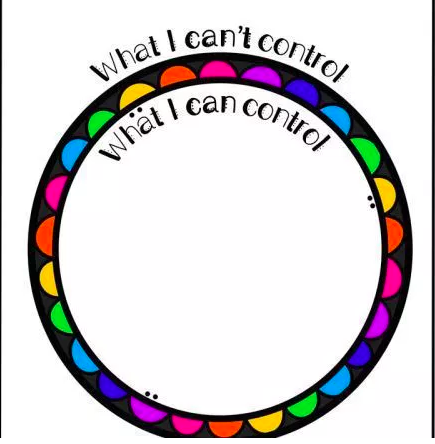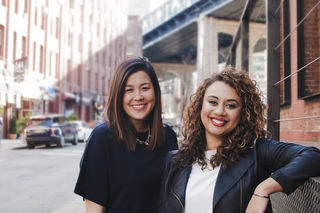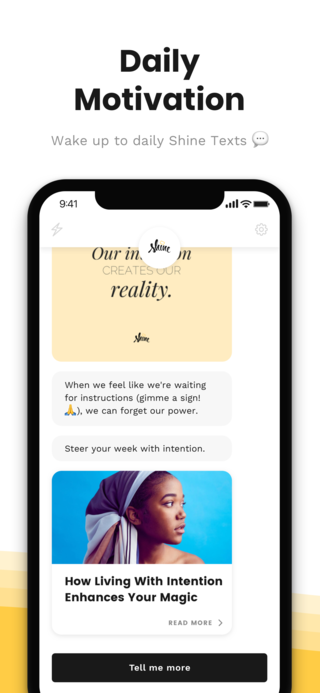Health
Self-Care in Your Pocket
A morning self-care reminder can change your day.
Posted November 13, 2018
“You run this week, Elana--and there’s power in knowing what’s in *and* out of your control. Today, try an ‘OOC list.’”
For the past few weeks, I’ve been getting texts like this one at 9 a.m. sharp. It’s like hearing from a personal coach, and sometimes even like hearing from a friend.
An OOC List is an approach taken by therapists everywhere to help people with anxiety break down their fears and spell out what’s within their sphere of control and what’s not. You may have even seen images like this -

What was amazing to me about this text that I got from Shine was that it wasn’t from a therapist. It made mental health--something that can feel overwhelming, technical, aspirational--feel very accessible. Like in my pocket or my purse accessible. Like a text at whatever time works for me accessible.
That’s the goal of the Shine founders, Marah Lidey and Naomi Hirabayashi. Through their work at DoSomething.org, Lidey and Hirabayashi found that if they could nail the tone of texts, making them sound like they were coming from a friend, they could motivate young people to change their behavior. In the case of DoSomething.org, the desired behavior was volunteerism.

This experience successfully motivating young people to volunteer made them think what else they might be able to change through texts. Together, as friends, they had provided support to each other in this way--motivational, supportive texts that allowed them to celebrate together as well as come through tough times together.
They’d also seen that people communicate via text about very intimate things. Crisis Text Line was born from DoSomething.org’s experience with texting, where the people on the receiving end of the organization’s texts responded with true needs.
Their goal with Shine is to break down the “spiral of silence” that occurs around challenging life experiences. They wanted to normalize that life is full of ups and downs and give each other “tactical ways to move forward,” such as suggestions for what to do based on personal, peer experience. The advice they wanted to offer would feel peer-to-peer, non-judgmental, and not top-down.
Even more importantly, they acknowledged, from their own personal experiences and those of friends, that well-being doesn’t always feel accessible. From a class and financial standpoint, not everyone can do “green juice, yoga, and a 30-day sabbatical.”
But, more people could:
- Take 5 minutes before a really stressful meeting and text a friend
- Set aside 5 minutes before bed to wind down
- Wake up a little early to listen to a favorite podcast
Lidey and Hirabayashi wanted what they created to representing “the real-world experience that people have” and “make it easier for people like us to take care of ourselves on a day-to-day basis.”
They also developed Shine in the context of a time in which positivity “got legs": More companies were pushing positive thinking, and Shine aims to do something different.

Rather than people feeling like they can’t “do” self-care the way they see it on Instagram, Shine aims to help “move people from shame, judgment, and fear to a place of compassion. We are working on cultivating self-compassion rather than eradicating negativity.”
That difference comes through in the user experience of Shine. It is about “managing your well-being as a daily habit, not as a trend,” Hirabayashi says.
On Election Day, Shine pushed out through their app a guided meditation for users to listen to while walking to the polls. Text-wise, users received guidance this past week on how to set boundaries through a “yes test,” journal prompts to help notice what brings you joy, and the experience of one Shine user navigating a life decision once she realized that she needed to make a change.
If you could use ideas for making well-being a daily habit, you can sign up for Shine at https://www.shinetext.com/ and/or download the iOs app via the App Store.
---
The OOC List--what’s out of my control--was just one of the resources I’ve received from Shine, a startup that’s aiming to change how people think about and access mental health resources.
I’d encourage you to create one for yourself. You do not need a Pinterest-worthy image to fill in - you can use one piece of paper or a Google doc and just make two lists:
Here’s what’s in your control:
- Your words
- Your actions
- Your ideas
- Your responses
- Your effort
- Your mistakes
- Your behavior
And what’s not:
- Other people’s words
- Other people’s actions
- Other people’s ideas
- Other people’s feelings
- Other people’s effort
- Other people’s mistakes
- Other people’s behavior
Copyright 2018 Elana Premack Sandler, All Rights Reserved




